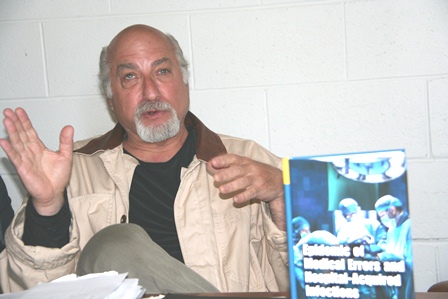University Hospital Zurich
Raemistrasse 100 Zurich, Zurich (Switzerland)
German Hospital Service
Destouchesstr. 1 Munchen, Bayern (Germany)
Moorfields Eye Hospital NHS Trust
162 City Road London, Greater London (UK)
Flinders Medical Centre
Flinders Drive, Bedford Park South Australia (Australia)
Reducing hospital errors would save lives money advocates

The number of people affected by mistakes in Canadas hospitals every week could fill three passenger jet planes says the president of the Ontario Council of Hospital unions
And if three jumbo jets were crashing every week would the government act to stop it Michael Hurley asked We think they would
Hurley was joined at a news conference this week by William Charney a publichealth activist who put together a book entitled Epidemic of Medical Errors and HospitalAcquired Infections in the US and Canada The Systemic Causes The pair are touring Ontario to promote not only the issue but a June 4 conference on medical errors in Toronto
Charney says errors and the infections people pick up while in hospital are the secondleading cause of all deaths in Canada
While there are no official statistics detailing how many people are affected Charney says he estimates that between 30000 and 60000 people are affected each year in Canada Many other countries the UK the Netherlands the US keep those statistics and Charney says the Canadian figure is extrapolated from those figures and other data from Canadian hospitals
Quebec is the only province that requires hospitals to report information on medical mistakes he said And even with several hospitals failing to file statistics he said 179000 mistakes were reported last year
He cites a lack of handwashing by staff bed sores caused by lack of care for seriously ill patients and improperly cleaning and disinfection by janitorial staff as the major causes of hospital errors and infections that are killing people And the cause of many of those problems is tight hospital budgets where the value of cleaning services and oneonone time with patients is critically undervalued
However saving a few dollars in the cleaning budget ends up costing hospital much more in the long run he said Curing someones bed sores for example costs at least 10000 a patient who contracts C difficile a potentially deadly infection has to stay in hospital an average of 17 extra days at a cost of 1000 a day battling an outbreak of MRSA costs about 14000 a patient
Not only are bed sores expensive to treat theyre very painful for patients Charney said And they can be prevented by turning patients over every few hours
Because of budget austerity however he said staffing levels dont allow for that level of care But its false economy because it ends up costing hospitals more in the long run
And infectious diseases are spread not only through the lack of handwashing but by inadequate cleaning and disinfection of hospital floors beds etc Charney cited a British study that found a direct link between cutting cleaning budgets and higher hospital infection rates
Unlike medical errors infection rates are tracked by Canadian hospitals The rate for Sudburys Health Sciences North can be found at httpwwwcihicaCIHIextportalinternetendocumentfullhealthsystemperformanceindicatorsperformanceindicatorent The statistics for March reported no cases of hospital infections such as VRE or MRSA but there were five cases of C difficile with no reported deaths And overall the infection rate in Sudbury is lower than the Canadian average
However since these are statistics the hospitals report themselves Charney questions their value While he has no knowledge of whats going on in Sudbury specifically he says the process itself is flawed and the rates are inaccurate
We dont believe the numbers because theyre selfreporting he said And selfreporting is junk science We know the infection rates are higher
Other countries have found that a ratio of one nurse for every four patients results in significantly lower medical mistakes But in Canada nurses are typically overworked and suffer from fatigue and burnout Plus cleaning budgets in Canada have been cut by 25 per cent since 1999
And thats what can kill patients he said
Charney estimates that medical mistakes costs Canadas healthcare system at least 7 billion a year He wants the provinces to do a rigorous costbenefit analysis of what it would cost to make a significant investment in hiring more nurses and cleaning staff versus the money that would be saved by reducing mistakes and infections
The Netherlands and Scotland have invested billions and significantly reduced their rates of medical mistakes he said We know beyond a shadow of a doubt the benefits of having more nursing and cleaning staff
Hes also calling for mandatory reporting of mistakes for all of Canadas hospitals more hospital beds overall and an improved patienttonurse ratio to ensure patients get the individual care they need to recover and leave hospital as quickly as possible
Date : 21 May, 2012
Reference : http://www.northernlife.ca/news/localNews/2012/05/19-medical-mistakes.aspx
